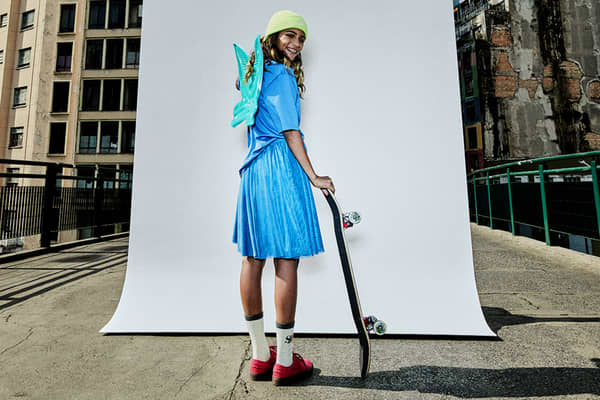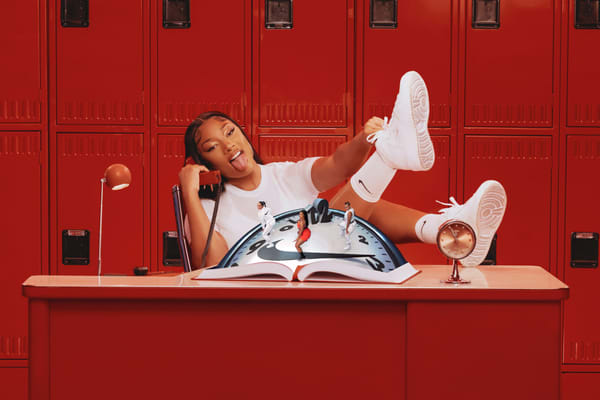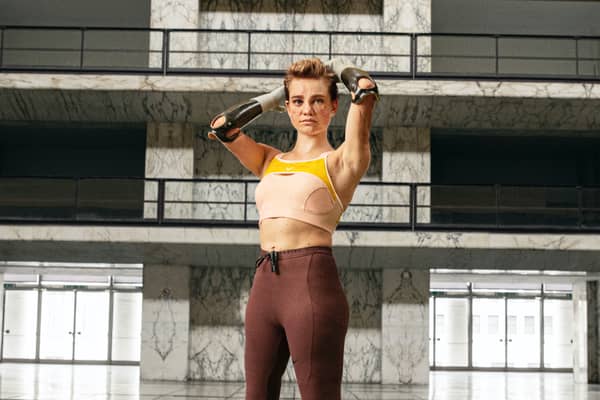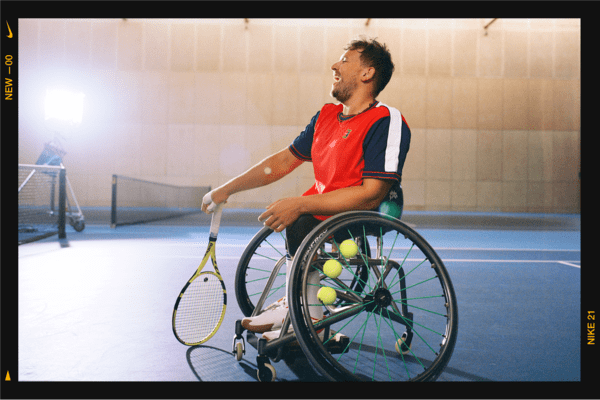New Attitudes
Ellie Carpenter
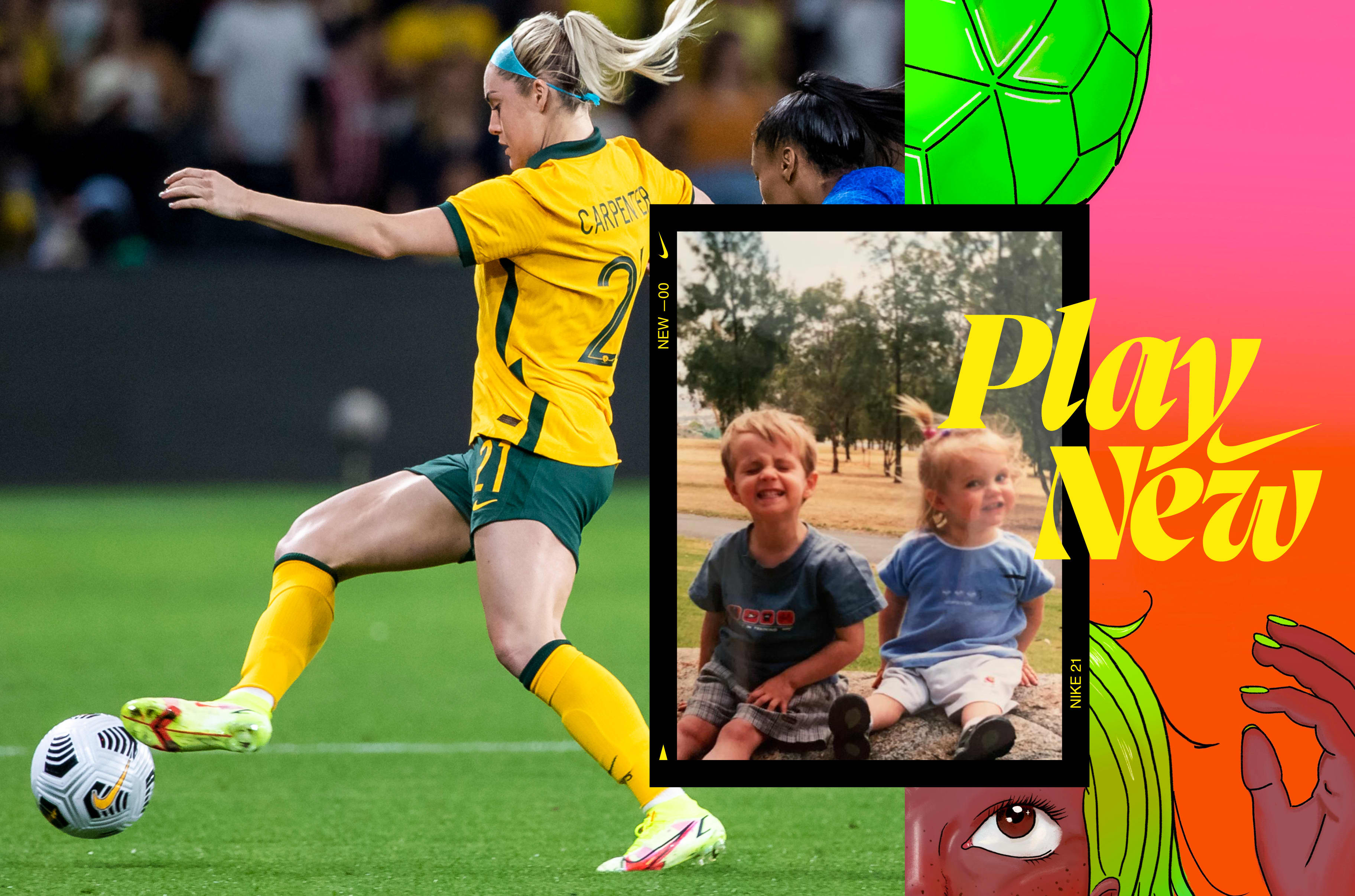
Ellie and Jeremy Carpenter: The power of play
Ellie Carpenter was four when she played her first game of football. She remembers clinging to the goalpost and refusing to let go. A little over a decade later, she was debuting for the Matildas.
Chasing each other around their backyard in Cowra, in regional NSW, gave Ellie and big brother Jeremy – also an elite player – the perfect grounding for professional careers. Their parents were PE teachers, so it was only natural that they were encouraged to play sport. But that encouragement never came with any pressure. “They just wanted us to be active,” Ellie says of her parents. “I remember mum always took me and my brother down to the park for hours.”
Growing up ‘in the middle of nowhere’ meant that the pair inspired, supported and pushed each other but it also instilled in them a sense of playful competition, something they have both kept in their professional lives.
Through all the ups and downs of elite sport, Ellie continues to bring that playfulness and fun to the Matildas and her club-side, Olympique Lyonnais. “I think it's important to be yourself, because that's when you play your best football,” Ellie says.

You grew up in Cowra, four hours west of Sydney. What was it like growing up there?
Ellie: I'm so grateful that I did grow up in the country because I feel like I did every sport, growing up. We lived on a farm with so much acreage. So in the middle of nowhere really, we couldn't see any neighbors or anything. And I was pretty lucky that we had a tennis court, a little soccer field. Every kind of sporting equipment you could imagine, we had. So every day after school, or before school, me and my brother would be out playing some sort of sport.
You’re quite close in age, what was the dynamic between you growing up?
Ellie: I think it was definitely fun in the early stages. But then after, so competitive.
I started playing very young, around four.
I'd play with my brother and hold his hand and run around the field. But I always just wanted to be with him and play with him and play with the boys.
Jeremy: Because we're only a year and a half apart age wise it was natural for us to compete at a lot of things. And I like to think we pushed each other to try new things.

“When I have the ball at my feet and I'm dribbling with it, that's when I feel the most like myself.”
— Ellie Carpenter
Ellie, you were playing in a boys competition when you were 12. What was that experience like?
Ellie: If I didn't grow up playing with the boys, I wouldn't be the player that I am today.
I remember going to games, and the boys would look at me like, "Is she in the wrong place? Is she supposed to be here?" I'm rocking up with my full headband, and ribbons and everything. I think at first the boys were a bit like, "Should we go near her?" And then I'd be smashing them to the ground and that's when they would let go and play like they would against the boys. I think I gained their respect, by just playing how I would.
Did you ever worry for her, Jeremy, or did she always have it covered?
Jeremy: I didn't even think about it as a kid. When you look back at it in hindsight, it was a big deal. I probably would've been more confused if she wasn't playing. Because I think she's always been at that level, gender aside.
It was something that didn't even cross my mind how significant that was, at the time.

Where do you think the belief that you had from such a young age came from?
Ellie: I believed in myself because my parents believed in me. And they never forced Jeremy and I to train, or anything.
It was just, "Let's go, and like give it a shot." I didn't get much pressure or put pressure on myself and I just let it come naturally.
Jeremy: I think one of the reasons why we sustained our love for sport is because our parents gave us a level of autonomy. They didn't really make us feel like we were pushed to do anything.
How important is it to carry some of that playfulness and joy from when you were kids into your professional life?
Ellie: I think it is important to have a bit of fun, a bit of a laugh. Otherwise, it's way too serious.
Even though we know what we're preparing for, sometimes you have to relax a little bit because that's when you get the best out of yourself as well, when you're not so stressed. If you focus on one thing too much, I feel like you're overthinking all the time. And that doesn't always end well.

The Matildas are one of the most loved and watched teams in the country. How do you retain your sense of self with the spotlight on you?
Ellie: I feel like when I first went into the team, obviously I was a little bit in my shell.
I think it's just coming back to what made me a footballer. Bring it all back to the basics. And just doing the simple things. Remembering that I like to do this; this makes me feel good.
I love being on the pitch, with the ball at my feet. I feel that's when I can express myself the most. When I have the ball at my feet and I'm dribbling with it, that's when I feel the most like me.
What about celebrating on the field? Is that something you think about before the moment?
Jeremy: I wasn't into celebrations, I rather enjoyed embracing the team after someone did something well. But I think Ellie’s the celebratory queen. She always thinks about how she can perform for the crowd.
Ellie: I've just been really enjoying myself on the field lately. Having good teammates around you is really important. That's what makes it fun.
What have you learnt from each other?
Ellie: Jeremy was so hardworking, and he left quite young. He went overseas to play professionally at 15 or 16. So seeing him do that, and being so brave, knowing that he had the guts to do it, I'd seen that he could do that, and I was like, "Oh, I think I can do that as well."
He's strong mentally and can overcome anything—he had a few injuries as well. So I think it's just his resilience.
Jeremy: I think we looked to each other a lot for inspiration in different parts of the game. Obviously, from a young age, I knew my sister was definitely a high-level athlete in every aspect.
I think as she's gotten older and, obviously, as she's experienced a lot more, every day I grow more proud of what she's achieved and where she's heading towards as a player and person. Yeah. I think she's very much developed into an amazing human, so I'm very proud to be able to call her my sister.


